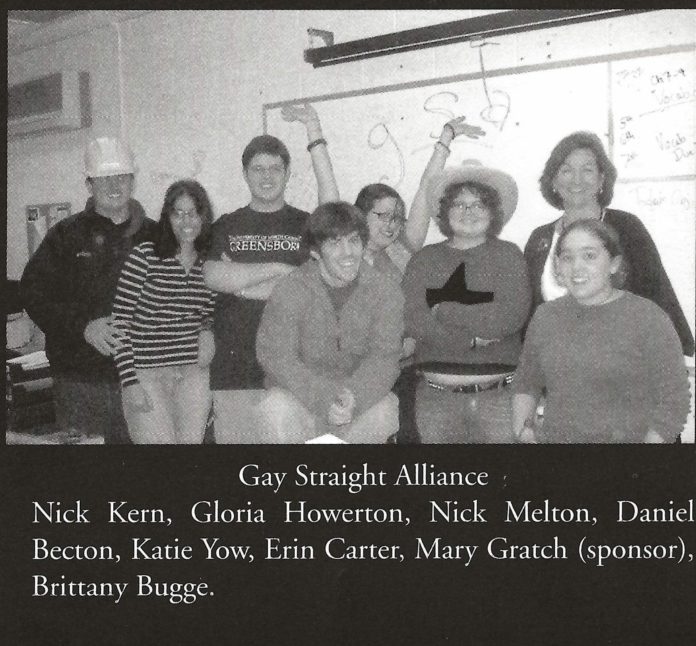
QSA at 25: Part Five
This article is the fifth in a series of articles examining the founding and legacy of the Queer-Straight Alliance at Chapel Hill High School.
It all started with a word search assignment, which one student turned in with homophobic profanity in it, prompting former Chapel Hill student Daniel Becton to become involved in the Gay-Straight Alliance (GSA) and other social reform groups.
“It was really common for people to say homophobic things in passing, like ‘That’s so gay,’” Becton explained.
Club members went into homeroom classes to talk about the impact of language, specifically homophobic language, and how it makes a difference, in response to the word search and other incidents like it.
“It was an important time to have a GSA, I think,” Becton reflected.
Becton continues to focus on improving educational environments for diverse students 15 years after serving as co-president of the GSA, now known as the Queer-Straight Alliance (QSA).
He attended Chapel Hill from 2000 to 2004.
Mary Gratch, now a college-selection specialist based in North Carolina, was Becton’s guidance counselor and a club advisor for the GSA since its founding in 1994. She encouraged him to get involved, a commitment that led to his becoming co-president of GSA his senior year.
“He was the best,” Gratch said. “He was a valiant leader.”
During Becton’s time at Chapel Hill, the national conversation surrounding gay marriage was picking up.
The 2004 edition of Hillife, Chapel Hill’s yearbook, displayed the GSA under the heading “Controversial Clubs.” The club “gave students an opportunity to talk freely,” but “others disapproved of the club and criticized those who were in it,” according to a description in the yearbook.
“There was starting to be a lot of national political issues around sexuality that I was paying attention to and there were homophobic incidents at Chapel Hill High that I was aware of,” Becton said.
Becton also played on the Chapel Hill men’s soccer team and served as an assistant coach for a middle school basketball team during his time at Chapel Hill.
“There was a lot of pressure to be seen in certain ways in terms of gender and sexuality; there were definitely homophobic jokes and [there was] pressure to ‘be a man,’ whatever that means,” Becton said. “In terms of what you hear in the news these days, like ‘boys will be boys’ or ‘locker-room talk,’ it was definitely still happening then, and I think it continues to be a common climate in sports.”
Overall, Becton does not think the club was as controversial as it was made out to be.
“People were more likely to just be dismissive or slightly annoyed than to be really angry that we were a club,” Becton said. “The school was very supportive and they wanted us to be leaders because the school’s values and ethos definitely fit with what the QSA is about.”
Becton’s involvement with GSA has proved to be extremely influential in his life.
“It was the first time I started to think about what it means to be an ally and how I can use my own identities and my own access to privilege to combat oppression and to make a difference in the way I want to,” Becton said.
He continued on to become active in lesbian, gay, bisexual, transgender and queer politics at the University of North Carolina at Chapel Hill, where he went to college, and got a masters in gender studies.
He now works as Manager of Special Projects at the Harvard College Dean of Students Office.
“I’m interested in how to make college spaces more inclusive for everyone, including people who are queer and in terms of gender, but also in terms of things like racial diversity, political diversity and religious diversity,” Becton said.
Becton advocates for a diverse selection of learning materials in the classroom.
“More traditional syllabi or readings are sort of homogenous–all straight white men’s ideas, in some cases,” Becton said, “so there are efforts to make what we are reading more diverse and and not just universalize one perspective.”
Becton’s work extends to student life outside of the classroom, where his work is guided by two questions: “Are there places where a queer student can go and find community? Are there places where students of color can go and feel safe and connected to other people?’”
A decade-and-a-half after becoming co-president of Chapel Hill’s GSA, Becton continues to focus on making a difference in the lives of students.
“[It’s important to try] to build systems within institutions that make the experience of going to school something that is more inclusive, which is something that can help everybody grow and isn’t just really serving a limited portion of the student population,” Becton said.











